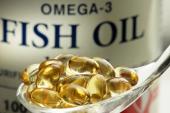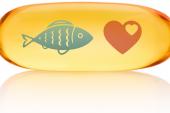VITAL RHYTHM in Print: Dose Effects of Omega-3s on AF Still Unclear
The trial saw no help nor harm from standard-dose vitamin D and omega-3s but didn’t acquit the higher doses of EPA/DPA.

Results for the VITAL RHYTHM trial, showing no benefit to either omega-3 fatty acids or vitamin D3 supplements in preventing a first diagnosis of atrial fibrillation (AF), are now published in JAMA. As reported by TCTMD, the findings from the more than 25,000-patient trial were first released at the American Heart Association (AHA) virtual meeting last November.
The numbers now in print are nearly identical to what the trial’s principal investigator, Christine Albert, MD, MPH (Smidt Heart Institute at Cedars-Sinai, Los Angeles, CA), presented last year and “do not support the use of either agent for the primary prevention of incident AF,” Albert and colleagues conclude.
Speaking with TCTMD this week, Albert pointed out that in the time since her AHA presentation several trials have been published suggesting that there might be an adverse effect of omega-3 supplementation on AF risk, so the VITAL RHYTHM authors made a point of addressing that in their newly published results.
REDUCE-IT and STRENGTH, both randomized trials using omega-3s at a dose of 4.0 g/day, reported an increase in AF among patients randomized to the study agent. STRENGTH used a formulation of eicosapentaenoic acid (EPA) and docosahexaenoic acid (DHA), whereas REDUCE-IT used a purified form of EPA only. Likewise, OMEMI, a randomized trial of EPA/DPA at a dose of 1.8 g/day in elderly patients post-MI, failed to demonstrate a beneficial effect of the supplement on a combined primary endpoint; it also saw a near-doubling in first-time AF rate among patients taking omega-3s, although the finding missed statistical significance.
“Our dosage was much lower than those trials,” Albert told TCTMD, adding that—as others have suggested—differences between EPA and DHA may in part explain the different findings between studies; the dose of omega-3 fatty acids given in VITAL RHYTHM was a combination of EPA (460 mg) and DHA (380 mg). Albert and colleagues caution that smaller elevations in AF may not have been detected in their study as a result of the trial design, despite efforts to confirm arrhythmias that were diagnosed clinically.
Nevertheless, VITAL RHYTHM, using commercially available supplements, didn’t see the signal reported in these other recent trials. “At least in our study, our confidence intervals kind of rule out the level of risk that was shown in those studies, so even though we can't say that there isn't a small risk, our confidence intervals don't get anywhere near the risk that was reported in those studies,” Albert said. “There does seem to be a difference between their results and our results, and hopefully our results are somewhat reassuring for people who are taking low-dose fish oil.”
Help or Harm
VITAL RHYTHM, an ancillary study of the VITAL trial, was intended to quell some of the confusion over whether marine-derived omega-3 supplements and vitamin D help reduce AF or might actually increase arrhythmia risks. As the authors note in the published results, VITAL RHYTHM saw no difference in the rates of new AF between patients randomized to placebo and those randomized to omega-3s or to vitamin D. New information in the paper includes subset analyses of arrhythmia types, as well as several post-hoc analyses, but they don’t alter the study’s overall conclusions, Albert stressed.
An editor’s note accompanying Albert et al’s paper attempts to put all four studies in perspective. “Considered together, the data from the four trials suggest, but do not prove, that there may be a dose-related risk of AF with omega-3 fatty acid intake. At a dose of 4.0 g/d, there was a highly statistically significant increase in risk (nearly a doubling). With an intermediate dose of 1.8 g/d, the increase in risk (hazard ratio, 1.84) did not achieve statistical significance, and with a standard daily dose of 840 mg/d, there was no apparent increase in risk (although the data were consistent with as much as a 24% increase in risk),” writes JAMA deputy editor Gregory Curfman, MD (Brigham and Women’s Hospital, Boston, MA). “Patients who choose to take omega-3 fatty acids, especially in high doses, should be informed of the risk of AF and followed up for the possible development of this common and potentially hazardous arrhythmia.”
To TCTMD, Albert emphasized that the findings apply to over-the-counter supplement use, which she said is still common among her patients. “These studies don't change the recommendations of the AHA or any of the dietary recommendations to include fish in a healthy meal, but at this point it doesn't look like taking these supplements is going to keep you from having atrial fibrillation, for sure, and it's mixed for some of the other heart disease endpoints,” she said.
It’s not clear that this message is reaching physicians, let alone patients. “It’s interesting: I still see patients that have atrial fibrillation, they are healthy and they are taking a high-dose fish oil supplements, so I stop it,” Albert said. But advice to take a supplement must still be coming from somewhere, she noted. “So I don't know how much it has penetrated because there are still a lot of people on fish oil supplements.”
She’d like to see further follow-up of studies like REDUCE-IT and STRENGTH to get a better understanding of the signals seen. “I think the concern is that there are agents that potentially can lower cardiovascular risk that potentially also might increase atrial fibrillation, like the REDUCE-IT trial showed,” she said. “I think it's important to understand what the clinical significance of a small elevated risk of atrial fibrillation versus the benefit is. . . . Three studies showing some risk does make you a little concerned that that could be a real signal at a higher dose.”
Shelley Wood was the Editor-in-Chief of TCTMD and the Editorial Director at the Cardiovascular Research Foundation (CRF) from October 2015…
Read Full BioSources
Albert C, Cook NR, Pester J, et al. Effect of marine omega-3 fatty acid and vitamin d supplementation on incident atrial fibrillation. JAMA. 2021;325:1061-1073.
Curfman G. Omega-3 fatty acids and atrial fibrillation. JAMA. 2021;325. 1073.
Disclosures
- Albert reports receiving grants from St. Jude Medical, Abbott, and Roche Diagnostics.
- Curfman reports no relevant conflicts of interest.






Comments